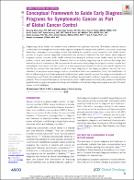| dc.contributor.author | Koo, Monica Minjoung | |
| dc.contributor.author | Unger-Saldaña, Karla | |
| dc.contributor.author | Mwaka, Amos Deogratius | |
| dc.contributor.author | Corbex, Marilys | |
| dc.contributor.author | Ginsburg, Ophira | |
| dc.contributor.author | Walter, M. Fiona | |
| dc.contributor.author | Calanzani, Natalia | |
| dc.contributor.author | Moodley, Jennifer | |
| dc.contributor.author | Rubin, P. Greg | |
| dc.contributor.author | Lyratzopoulos, Georgios | |
| dc.date.accessioned | 2021-04-29T09:43:25Z | |
| dc.date.available | 2021-04-29T09:43:25Z | |
| dc.date.issued | 2021-01-06 | |
| dc.identifier.citation | Koo, M.M., Unger-Saldaña, K., Mwaka, A.D., Corbex, M., Ginsburg, O., Walter, F.M., Calanzani, N., Moodley, J., Rubin, G.P. and Lyratzopoulos, G., 2021. Conceptual Framework to Guide Early Diagnosis Programs for Symptomatic Cancer as Part of Global Cancer Control. JCO Global Oncology, 7, pp.35-45. | en_US |
| dc.identifier.issn | 2687-8941 | |
| dc.identifier.uri | http://hdl.handle.net/20.500.12280/2791 | |
| dc.description.abstract | Diagnosing cancer earlier can enable timely treatment and optimize outcomes. Worldwide, national cancer control plans increasingly encompass early diagnosis programs for symptomatic patients, commonly comprising awareness campaigns to encourage prompt help-seeking for possible cancer symptoms and health system policies to support prompt diagnostic assessment and access to treatment. By their nature, early diagnosis programs involve complex public health interventions aiming to address unmet health needs by acting on patient, clinical, and system factors. However, there is uncertainty regarding how to optimize the design and evaluation of such interventions. We propose that decisions about early diagnosis programs should consider four interrelated components: first, the conduct of a needs assessment (based on cancer-site–specific statistics) to identify the cancers that may benefit most from early diagnosis in the target population; second, the consideration of symptom epidemiology to inform prioritization within an intervention; third, the identification of factors influencing prompt help-seeking at individual and system level to support the design and evaluation of interventions; and finally, the evaluation of factors influencing the health systems’ capacity to promptly assess patients. This conceptual framework can be used by public health researchers and policy makers to identify the greatest evidence gaps and guide the design and evaluation of local early diagnosis programs as part of broader cancer control strategies. | en_US |
| dc.language.iso | en | en_US |
| dc.publisher | Wolters Kluwer Health, Inc. | en_US |
| dc.relation.ispartofseries | JCO Global Oncology;7 | |
| dc.subject | Conceptual framework | en_US |
| dc.subject | Early diagnosis | en_US |
| dc.subject | Symptomatic cancer | en_US |
| dc.subject | Cancer control | en_US |
| dc.title | Conceptual Framework to Guide Early Diagnosis Programs for Symptomatic Cancer as Part of Global Cancer Control | en_US |
| dc.type | Article | en_US |


